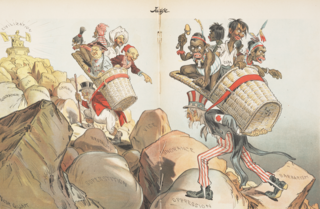Related Research Articles

Joseph Rudyard Kipling was an English novelist, short-story writer, poet, and journalist. He was born in British India, which inspired much of his work.
This is a bibliography of works by Rudyard Kipling, including books, short stories, poems, and collections of his works.

"The White Man's Burden" (1899), by Rudyard Kipling, is a poem about the Philippine–American War (1899–1902) that exhorts the United States to assume colonial control of the Filipino people and their country. Originally written to celebrate the Diamond Jubilee of Queen Victoria, the jingoistic poem was replaced with the sombre "Recessional" (1897), also a Kipling poem about empire.

"Recessional" is a poem by Rudyard Kipling. It was composed for Queen Victoria's Diamond Jubilee, in 1897.

Gunga Din is a 1939 American adventure film from RKO Radio Pictures directed by George Stevens and starring Cary Grant, Victor McLaglen, and Douglas Fairbanks Jr., loosely based on the 1890 poem of the same name by Rudyard Kipling combined with elements of his 1888 short story collection Soldiers Three. The film is about three British sergeants and Gunga Din, their native bhisti, who fight the Thuggee, an Indian murder cult, in colonial British India.

"Mandalay" is a poem by Rudyard Kipling, written and published in 1890, and first collected in Barrack-Room Ballads, and Other Verses in 1892. The poem is set in colonial Burma, then part of British India. The protagonist is a Cockney working-class soldier, back in grey restrictive London, recalling the time he felt free and had a Burmese girlfriend, now unattainably far away.
"The Blue Mountains" is a poem written by Alfred Noyes, and set to music by the English composer Edward Elgar. It was one of the songs written to be performed in the Pageant of Empire at the British Empire Exhibition in Wembley Park, London, on 21 July 1924.
"The Immortal Legions" is a poem written by Alfred Noyes, and set to music by the English composer Edward Elgar. It was one of the songs written to be performed in the Pageant of Empire at the British Empire Exhibition on 21 July 1924.
"Sailing Westward" is a poem written by Alfred Noyes, and set to music by the English composer Edward Elgar. It was one of the songs written to be performed in the Pageant of Empire at the British Empire Exhibition, Wembley Park, on 21 July 1924.

The Fringes of the Fleet is a booklet written in 1915 by Rudyard Kipling (1865–1936). The booklet contains essays and poems about nautical subjects in World War I.
The Pageant of Empire was name given to various historical pageants celebrating the British Empire which were held in Britain during the early twentieth century. For example there was a small Pageant of Empire at the town of Builth Wells in 1909. In 1911 a giant Pageant of Empire took place at the Festival of Empire at the Crystal Palace in Sydenham, where thousands of amateur performers acted out historical scenes The most notable was the Pageant of Empire which took place in London in 1924.
Pageant of Empire is the title given to a set of songs, to words by Alfred Noyes, written by the English composer Sir Edward Elgar and given important positions in the Pageant of Empire at the British Empire Exhibition at Wembley Park.

Alice Caroline Kipling was one of the MacDonald sisters, Englishwomen of the Victorian era, four of whom were notable for their contribution to the arts and their marriages to well-known men. A writer and poet, she was the mother of the author Rudyard Kipling, aunt of British Prime Minister Stanley Baldwin, and sister-in-law of Edward Poynter and Edward Burne-Jones.
"Big Steamers" is a poem by Rudyard Kipling, first published in 1911 as one of his twenty-three poems written specially for C. R. L. Fletcher's "A School History of England". It appears in the last chapter of the book. It is intended for children, with the verses responding with facts and humour to their curiosity about the 'big steamers' - as the merchant ships are called.
"In the Neolithic Age" is a poem by the English writer Rudyard Kipling. It was published in the December 1892 issue of The Idler and in 1896 in his poetry collection The Seven Seas. The poem is the source of the quotation: "There are nine and sixty ways of constructing tribal lays, / And every single one of them is right."
Vere Palgrave Stent (1872-1941) Journalist and war correspondent, theatre critic, playwright and author
A Choice of Kipling's Verse, made by T. S. Eliot, with an essay on Rudyard Kipling is a book first published in December 1941. It is in two parts. The first part is an essay by American-born British poet T. S. Eliot (1888-1965), in which he discusses the nature and stature of British poet Rudyard Kipling (1865-1936). The second part consists of Eliot's selection from Kipling's poems.
This is a summary of 1917 in music in the United Kingdom.
"McAndrew's Hymn" is a poem by English writer Rudyard Kipling (1865-1936). It was begun in 1893, and first published in December 1894 in Scribner's Magazine. It was collected in Kipling's The Seven Seas of 1896.
"The Mary Gloster" is a poem by British writer Rudyard Kipling (1865-1936). It is dated 1894, but seems to have been first published in his 1896 collection The Seven Seas.
References
- 1 2 3 MacDonald, Robert H. (1994). The language of empire: myths and metaphors of popular imperialism, 1880-1918. Manchester University Press. p. 169. ISBN 978-0-7190-3749-8.
- ↑ Boehmer, Elleke (2006). Colonial and postcolonial literature: migrant metaphors (2. ed.). Oxford University Press. p. 32. ISBN 978-0-19-925371-5.
- ↑ MacDonald, Robert H. (1994). The language of empire: myths and metaphors of popular imperialism, 1880-1918. Manchester University Press. p. 152. ISBN 978-0-7190-3749-8.
- ↑ Henderson, Archibald (1930). Contemporary immortals. Ayer Publishing. ISBN 978-0-8369-0533-5.